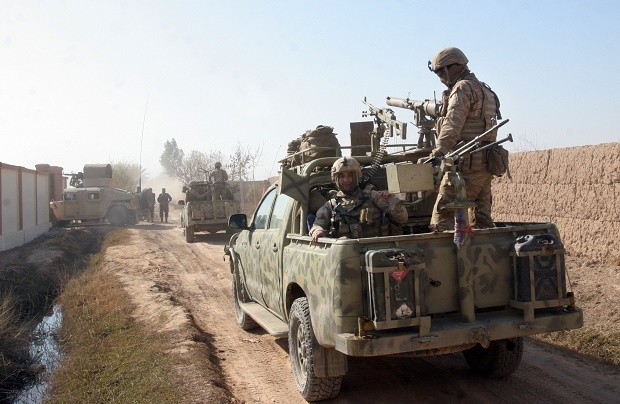Obama forced again to rethink troop numbers in Afghanistan

In this Dec. 22, 2015 file photo, Afghan security forces patrol in Nad Ali district of Helmand province, Afghanistan. Conditions in Afghanistan are getting worse, 15 years into a war that few Americans talk about any more. That’s preventing the clean ending that President Barack Obama hoped to impose before leaving office. Violence is on the rise, the Taliban are staging new offensives, the Islamic State group is angling for a foothold and peace prospects are dim. AP FILE PHOTO
WASHINGTON — Fifteen years into the war that few Americans talk about any more, conditions in Afghanistan are getting worse, preventing the clean ending that President Barack Obama hoped to impose before leaving office.
Violence is on the rise, the Taliban are staging new offensives, the Islamic State group is angling for a foothold and peace prospects are dim.
Afghanistan remains a danger zone. It’s hobbled by a weak economy that’s sapping public confidence in the new government. Afghan police and soldiers are struggling to hold together the country 13 months after the US-led military coalition culled its numbers by 90 percent.
The bottom line: For a second time, Obama is rethinking his plan to drop US troop levels from 9,800 to 5,500 before he leaves office in January 2017.
“I don’t see any drawdowns” in the near future, said James Dobbins, Obama’s former special envoy for Afghanistan and Pakistan. He predicted Obama would leave the decision to the next president.
Article continues after this advertisement“They are just hoping that things hold together and they won’t have to face a decision on whether to actually implement the force reduction they’re talking about until late summer, early fall, by which time the administration will be on its last legs,” Dobbins said.
Article continues after this advertisementTop military officials, as well as Republicans and Democrats in Congress, think that trimming the force any more during Obama’s presidency is a bad idea. Republican Sen. John McCain of Arizona, chairman of the Senate Armed Services Committee, said Thursday that Afghanistan was in a “crisis situation.”
READ: Obama turns to political dimensions of Afghan war
Initially, Obama announced plans to reduce the force to 5,500 troops by the end of last year, and to 1,000 by the end of 2016. Last fall, Obama changed his mind, saying the situation remained too fragile for the American military to leave. He announced plans to keep the current force of about 9,800 in place through most of 2016 to perform not in an offensive combat role but to continue counterterrorism missions and advise Afghans battling a resurgent Taliban.
It’s been a tough year on the Afghan battlefield.
Afghan soldiers and policemen — bankrolled by $4.1 billion in US taxpayer money — fought virtually on their own last year for the first time since the US invasion in 2001. NATO officials have told The Associated Press that Afghan troops are displaying prowess yet suffering sustained heavy casualties — 28 percent higher in 2015 than before the international combat mission ended in December 2014.
READ: Afghan battle ‘ongoing’ as US soldier killed—Pentagon
Lt. Gen. John “Mick” Nicholson, Obama’s pick to be the next top US commander in Afghanistan, said at his Senate confirmation hearing Thursday that the Afghan security forces have “more than held their own against the insurgency,” but are not yet “self-sustainable.”
Asked whether the US effort in 2015 had resulted in gains or losses, Nicholson replied: “The Taliban came at the Afghan security forces more intensely than perhaps we anticipated. Because of that, we did not make the advances we … thought we would make.”
When US and other foreign troops left on an announced schedule, the Taliban pounced.
Last fall, they briefly seized Kunduz, a city of 300,000 in northern Afghanistan. It marked the militants’ first capture of a major city since before the US-led invasion and was marred by the mistaken US strike on a charity hospital run by Doctors Without Borders, killing 42 people.
Hamdullah Mohib, Afghanistan’s ambassador to the United States, acknowledged that Kunduz was a setback. But he said it also reminded Afghans what life was like under the Taliban.
“They don’t want to return to that,” he said.
In the south, Afghan army units have been engaged in fierce fights with the Taliban for months in Helmand province, where militants sow more than $3 billion a year in opium revenue. The Afghan army in Helmand has been plagued by incompetence and corruption. The Afghan military recently fired and replaced top Afghan army leaders there.
Also in the south, US and Afghan forces last year killed 150 to 200 al-Qaida members in a large training camp, complete with tunnels, that was discovered in neighboring Kandahar province, another militant stronghold.
A current Afghan official, who spoke on condition of anonymity because he was not authorized to speak to the media, acknowledged the army’s many setbacks this year, but said the Taliban had sought to achieve major victories after the US-led coalition announced it would end its combat mission on Dec. 31, 2015. Instead, they failed to retake huge swaths of land, the official said.